- Home
- Harlan Ellison
The Top of the Volcano: The Award-Winning Stories of Harlan Ellison Page 34
The Top of the Volcano: The Award-Winning Stories of Harlan Ellison Read online
Page 34
We were beyond the first glacier that could be seen from Meditation Island, the spine of ice cartographers had named the Seurat. Now we were climbing through the NoName Cleft, the fuxes chinking out hand-and footholds with spears and claws, the Ba’al snarling and chewing pits for my own ascent. Green shadows swam down through the Cleft. One moment we were pulling ourselves up through twilight, and the next we could not see the shape before us. For an hour we lay flat against the ice face as a hysterical wind raged down the Cleft, trying to tear us loose and fling us into the cut below.
The double shadows flickered and danced around us. Then everything went into the red, the wind died, and through now-bloody shadows we reached the crest of the ridge beyond the Seurats.
A long slope lay before us, rolling to a plain of ice and slush pools, very different from the fields of dry ice that lay farther west to the lifeless expanse of Farside. Sunday was rapidly moving into Darkday.
Across the plain, vision was impeded by a great wall of frigid fog that rose off the tundra. Vaguely, through the miasma, I could see the great glimmering bulk of the Rio de Luz, the immense kilometers-long ice mountain that was the final barrier between the Terminator lands and the frozen nothingness of Farside. The River of Light.
We hurried down the slope, some of the fuxes simply tucking two, four, or six of their legs under them and sliding down the expanse to the plain. Twice I fell, rolled, slid on my butt, tried to regain my feet, tumbled again and decided to use my pack as a toboggan. By the time we had gained the plain, it was nearly Darkday and fog had obscured the land. We decided to camp till Dimday, hacked out sleeping pits in the tundra, and buried ourselves.
Overhead the raging aurora drained red and green and purple as I closed my eyes and let the heat of the envelope take me away. What could the “holy man” want from me after all this time?
We came through the curtain of fog, the Rio de Luz scintillating dimly beyond its mask of gray-green vapor. I estimated that we had come more than thirty kilometers from Meditation Island. It was appreciably colder now, and ice crystals glimmered like rubies and emeralds in the blue fux fur. And, oddly, a kind of breathless anticipation had come over the aborigines. They moved more rapidly, oblivious to the razor winds and the slush pools underfoot. They jostled one another in their need to go toward the River of Light and whatever the man out there needed me to assist with.
It was a long walk, and for much of that time I could see little more of the icewall than its cruel shape rising at least fifteen hundred meters above the tundra. But as the fog thinned, the closer we drew to the base of the ice mountain, the more I had to avert my eyes from what lay ahead: the permanent aurora lit the ice and threw off a coruscating glare that was impossible to bear.
And then the fuxes dashed on ahead and I was left alone, striding across the tundra toward the Rio de Luz.
I came out of the fog.
And I looked up and up at what rose above me, touching the angry sky and stretching as far away as I could see to left and right. It seemed hundreds of kilometers in length, but that was impossible.
I heard myself moaning.
But I could not look away, even if it burned out my eyes.
Lit by the ever-changing curtain of Medea’s sky, the crash and downdripping of a thousand colors that washed the ice in patterns that altered from instant to instant, the Rio de Luz had been transformed. The man had spent three years melting and slicing and sculpting—I couldn’t tell how many kilometers of living ice—into a work of high art.
Horses of liquid blood raced through valleys of silver light. The stars were born and breathed and died in one lacy spire. Shards of amber brilliance shattered against a diamond-faceted icewall through a thousand apertures cut in the facing column. Fairy towers too thin to exist rose from a shadowed hollow and changed color from meter to meter all up their length. Legions of rainbows rushed from peak to peak, like waterfalls of precious gems. Shapes and forms and spaces merged and grew and vanished as the eye was drawn on and on. In a cleft he had formed an intaglio that was black and ominous as the specter of death. But when light hit it suddenly, shattering and spilling down into the bowl beneath, it became a great bird of golden promise. And the sky was there, too. All of it, reflected back and new because it had been pulled down and captured. Argo and the far suns and Phrixus and Helle and Jason and Theseus and memories of suns that had dominated the empty places and were no longer even memories. I had a dream of times past as I stared at one pool of changing colors that bubbled and sang. My heart was filled with feelings I had not known since childhood. And it never stopped. The pinpoints of bright blue flame skittered across the undulating walls of sculpted ice, rushed toward certain destruction in the deeps of a runoff cut, paused momentarily at the brink, then flung themselves into green oblivion. I heard myself moaning and turned away, looking back toward the ridge across the fog and tundra; and I saw nothing, nothing! It was too painful not to see what he had done. I felt my throat tighten with fear of missing a moment of that great pageant unfolding on the ice tapestry. I turned back and it was all new, I was seeing it first and always as I had just minutes before…was it minutes…how long had I been staring into that dream pool…how many years had passed…and would I be fortunate enough to spend the remainder of my life just standing there breathing in the rampaging beauty I beheld? I couldn’t think, pulled air into my lungs only when I had forgotten to breathe for too long a time.
Then I felt myself being pulled along and cried out against whatever force had me in its grip that would deprive me of a second of that towering narcotic.
But I was pulled away, and was brought down to the base of the River of Light, and it was Ben of the Old Times who had me. He forced me to sit, with my back to the mountain, and after a very long time in which I sobbed and fought for air, I was able to understand that I had almost been lost, that the dreamplace had taken me. But I felt no gratitude. My soul ached to rush out and stare up at beauty forever.
The fux flowed with me, and through ekstasis I felt myself ceasing to pitch and yaw. The colors dimmed in the grottos behind my eyes. He held me silently with a powerful flow until I was William Pogue again. Not just an instrument through which the ice mountain sang its song, but Pogue, once again Pogue.
And I looked up, and I saw the fuxes hunkered around the body of their “holy man,” and they were making drawings in the ice with their claws. And I knew it was not I who had brought them to beauty.
He lay face-down on the ice, one hand still touching the laser tube. The hologram projector had been attached with a slipcard computer. Still glowing was an image of the total sculpture. Almost all of it was in red lines, flickering and fading and coming back in with power being fed from base camp; but one small section near the top of an impossibly angled flying bridge and minaret section was in blue line.
I stared at it for a while. Then Ben said this was the reason I had been brought to that place. The holy man had died before he could complete the dreamplace. And in a rush of flow he showed me where, in the sculpture, they had first understood what beauty was, and what art was, and how they were one with the Grandparents in the sky. Then he created a clear, pure image. It was the man, flying to become one with Argo. It was the stick figure in the mud: it was the uninvited guest with the lines of radiance coming out of his head.
There was a pleading tone in the fux’s ekstasis. Do this for us. Do what he did not have the time to do. Make it complete.
I stared at the laser lying there, with its unfinished hologram image blue and red and flickering. It was a bulky, heavy tube, a meter and a half long. And it was still on. He had fallen in the act.
I watched them scratching their first drawings, even the least of them, and I wept within myself; for Pogue who had come as far as he could, only to discover it was not far enough. And I hated him for doing what I could not do. And I knew he would have completed it and then walked off into the emptiness of Farside, to die quickly in the darkness, having done hi
s penance…and more.
They stopped scratching, as if Ben had ordered them to pay some belated attention to me. They looked at me with their slanted vulpine eyes now filling with mischief and wonder. I stared back at them. Why should I? Why the hell should I? For what? Not for me, that’s certain!
We sat there close and apart, for a long time, as the universe sent its best light to pay homage to the dreamplace.
The body of the penitent lay at my feet.
From time to time I scuffed at the harness that would hold the laser in position for cutting. There was blood on the shoulder straps.
After a while I stood up and lifted the rig. It was much heavier than I’d expected.
Now they come from everywhere to see it. Now they call it Oddum’s Tapestry, not the Rio de Luz. Now everyone speaks of the magic. A long time ago he may have caused the death of thousands in another place, but they say that wasn’t intentional; what he brought to the Medeans was on purpose. So it’s probably right that everyone knows the name Virgil Oddum, and what he created at the East Pole.
But they should know me, too. I was there! I did some of the work.
My name is William Ronald Pogue, and I mattered. I’m old, but I’m important, too. You should know names.
Dedicated to the genius of Simon Rodia
Creator of the Watts Towers
* * *
SOFT MONKEY
1988 Edgar Allan Poe Award: Best Short Story
At twenty-five minutes past midnight on 51st Street, the wind-chill factor was so sharp it could carve you a new asshole.
Annie lay huddled in the tiny space, formed by the wedge of locked revolving door that was open to the street when the document copying service had closed for the night. She had pulled the shopping cart from the Food Emporium at 1st Avenue near 57th into the mouth of the revolving door, had carefully tipped it onto its side, making certain her goods were jammed tightly in the cart, making certain nothing spilled into her sleeping space. She had pulled out half a dozen cardboard flats—broken-down sections of big Kotex cartons from the Food Emporium, the half dozen she had not sold to the junkman that afternoon—and she had fronted the shopping cart with two of them, making it appear the doorway was blocked by the management. She had wedged the others around the edges of the space, cutting the wind, and placed the two rotting sofa pillows behind and under her.
She had settled down, bundled in her three topcoats, the thick woolen merchant marine stocking cap rolled down to cover her ears, almost to the bridge of her broken nose. It wasn’t bad in the doorway, quite cozy, really. The wind shrieked past and occasionally touched her, but mostly was deflected. She lay huddled in the tiny space, pulled out the filthy remnants of a stuffed baby doll, cradled it under her chin, and closed her eyes.
She slipped into a wary sleep, half in reverie and yet alert to the sounds of the street. She tried to dream of the child again. Alan. In the waking dream she held him as she held the baby doll, close under her chin, her eyes closed, feeling the warmth of his body. That was important: his body was warm, his little brown hand against her cheek, his warm, warm breath drifting up with the dear smell of baby.
Was that just today or some other day? Annie swayed in reverie, kissing the broken face of the baby doll. It was nice in the doorway; it was warm.
The normal street sounds lulled her for another moment, and then were shattered as two cars careened around the corner off Park Avenue, racing toward Madison. Even asleep, Annie sensed when the street wasn’t right. It was a sixth sense she had learned to trust after the first time she had been mugged for her shoes and the small change in her snap-purse. Now she came fully awake as the sounds of trouble rushed toward her doorway. She hid the baby doll inside her coat.
The stretch limo sideswiped the Caddy as they came abreast of the closed repro center. The Brougham ran up over the curb and hit the light stanchion full in the grille. The door on the passenger side fell open and a man scrabbled across the front seat, dropped to all fours on the sidewalk, and tried to crawl away. The stretch limo, angled in toward the curb, slammed to a stop in front of the Brougham, and three doors opened before the tires stopped rolling.
They grabbed him as he tried to stand, and forced him back to his knees. One of the limo’s occupants wore a fine navy blue cashmere overcoat; he pulled it open and reached to his hip. His hand came out holding a revolver. With a smooth stroke he laid it across the kneeling man’s forehead, opening him to the bone.
Annie saw it all. With poisonous clarity, back in the V of the revolving door, cuddled in darkness, she saw it all. Saw a second man kick out and break the kneeling victim’s nose. The sound of it cut against the night’s sudden silence. Saw the third man look toward the stretch limo as a black glass window slid down and a hand emerged from the back seat. The electric hum of opening. Saw the third man go to the stretch and take from the extended hand a metal can. A siren screamed down Park Avenue, and kept going. Saw him return to the group and heard him say, “Hold the motherfucker. Pull his head back!” Saw the other two wrench the victim’s head back, gleaming white and pumping red from the broken nose, clear in the sulfurous light from the stanchion overhead. The man’s shoes scraped and scraped the sidewalk. Saw the third man reach into an outer coat pocket and pull out a pint of scotch. Saw him unscrew the cap and begin to pour booze into the face of the victim. “Hold his mouth open!” Saw the man in the cashmere topcoat spike his thumb and index fingers into the hinges of the victim’s jaws, forcing his mouth open. The sound of gagging, the glow of spittle. Saw the scotch spilling down the man’s front. Saw the third man toss the pint bottle into the gutter where it shattered; and saw him thumb press the center of the plastic cap of the metal can; and saw him make the cringing, crying, wailing victim drink the Drano. Annie saw and heard it all.
The cashmere topcoat forced the victim’s mouth closed, massaged his throat, made him swallow the Drano. The dying took a lot longer than expected. And it was a lot noisier.
The victim’s mouth was glowing a strange blue in the calcium light from overhead. He tried spitting, and a gobbet hit the navy blue cashmere sleeve. Had the natty dresser from the stretch limo been a dunky slob uncaring of what GQ commanded, what happened next would not have gone down.
Cashmere cursed, swiped at the slimed sleeve, let go of the victim; the man with the glowing blue mouth and the gut being boiled away wrenched free of the other two, and threw himself forward. Straight toward the locked revolving door blocked by Annie’s shopping cart and cardboard flats.
He came at her in fumbling, hurtling steps, arms wide and eyes rolling, throwing spittle like a racehorse; Annie realized he’d fall across the cart and smash her flat in another two steps.
She stood up, backing to the side of the V. She stood up: into the tunnel of light from the Caddy’s headlights.
“The nigger saw it all!” yelled the cashmere.
“Fuckin’ bag lady!” yelled the one with the can of Drano.
“He’s still moving!” yelled the third man, reaching inside his topcoat and coming out of his armpit with a blued steel thing that seemed to extrude to a length more aptly suited to Paul Bunyan’s armpit.
Foaming at the mouth, hands clawing at his throat, the driver of the Brougham came at Annie as if he were spring-loaded.
He hit the shopping cart with his thighs just as the man with the long armpit squeezed off his first shot. The sound of the .45 magnum tore a chunk out of 51st Street, blew through the running man like a crowd roar, took off his face and spattered bone and blood across the panes of the revolving door. It sparkled in the tunnel of light from the Caddy’s headlights.
And somehow he kept coming. He hit the cart, rose as if trying to get a first down against a solid defense line, and came apart as the shooter hit him with a second round.
There wasn’t enough solid matter to stop the bullet and it exploded through the revolving door, shattering it open as the body crashed through and hit Annie.
She was thr
own backward, through the broken glass, and onto the floor of the document copying center. And through it all, Annie heard a fourth voice, clearly a fourth voice, screaming from the stretch limo, “Get the old lady! Get her, she saw everything!”
Men in topcoats rushed through the tunnel of light.
Annie rolled over, and her hand touched something soft. It was the ruined baby doll. It had been knocked loose from her bundled clothing. Are you cold, Alan?
She scooped up the doll and crawled away, into the shadows of the reproduction center. Behind her, crashing through the frame of the revolving door, she heard men coming. And the sound of a burglar alarm. Soon police would be here.
All she could think about was that they would throw away her goods. They would waste her good cardboard, they would take back her shopping cart, they would toss her pillows and the hankies and the green cardigan into some trashcan; and she would be empty on the street again. As she had been when they made her move out of the room at 101st and First Avenue. After they took Alan from her…
A blast of sound, as the shot shattered a glass-framed citation on the wall near her. They had fanned out inside the office space, letting the headlight illumination shine through. Clutching the baby doll, she hustled down a hallway toward the rear of the copy center. Doors on both sides, all of them closed and locked. Annie could hear them coming.
A pair of metal doors stood open on the right. It was dark in there. She slipped inside, and in an instant her eyes had grown acclimated. There were computers here, big crackle-gray-finish machines that lined three walls. Nowhere to hide.
She rushed around the room, looking for a closet, a cubbyhole, anything. Then she stumbled over something and sprawled across the cold floor. Her face hung over into emptiness, and the very faintest of cool breezes struck her cheeks. The floor was composed of large removable squares. One of them had been lifted and replaced, but not flush. It had not been locked down; an edge had been left ajar; she had kicked it open.

 Repent, Harlequin! Said the Ticktockman
Repent, Harlequin! Said the Ticktockman Broken Glass
Broken Glass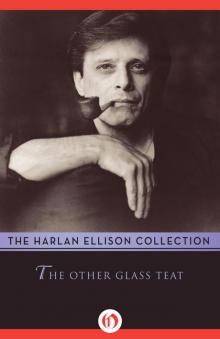 Other Glass Teat
Other Glass Teat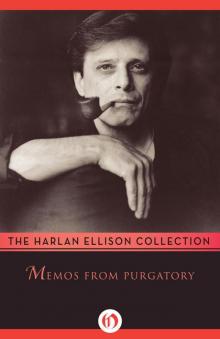 Memos From Purgatory
Memos From Purgatory I Have No Mouth and I Must Scream
I Have No Mouth and I Must Scream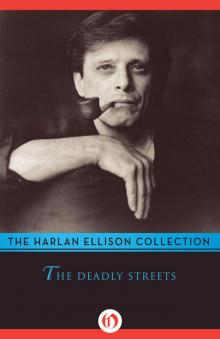 The Deadly Streets
The Deadly Streets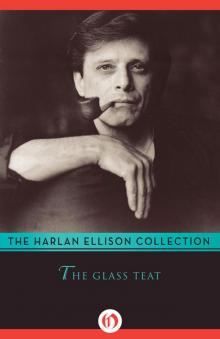 The Glass Teat
The Glass Teat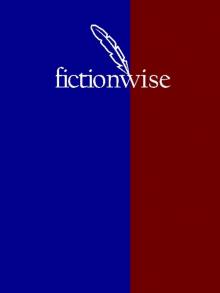 Paingod and Other Delusions
Paingod and Other Delusions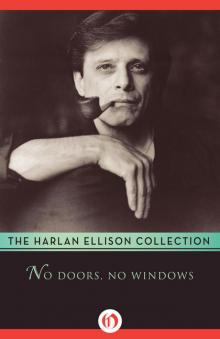 No Doors No Windows
No Doors No Windows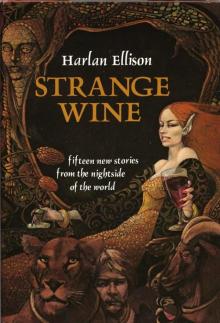 Strange Wine
Strange Wine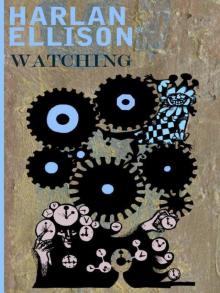 Harlan Ellison's Watching
Harlan Ellison's Watching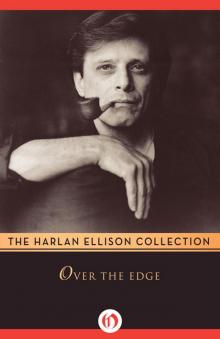 Over the Edge/An Edge in My Voice
Over the Edge/An Edge in My Voice Troublemakers: Stories by Harlan Ellison
Troublemakers: Stories by Harlan Ellison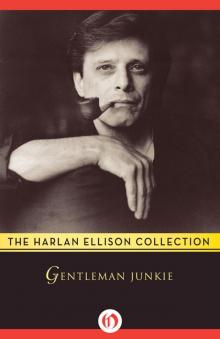 Gentleman Junkie and Other Stories of the Hung-Up Generation
Gentleman Junkie and Other Stories of the Hung-Up Generation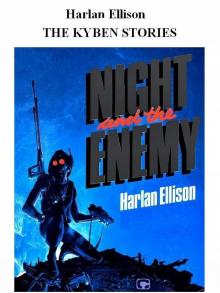 The Kyben Stories
The Kyben Stories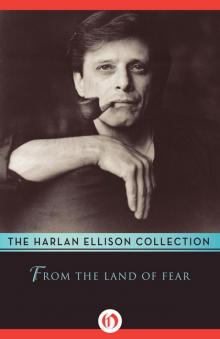 From the Land of Fear
From the Land of Fear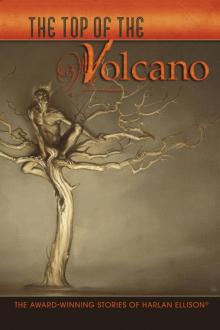 The Top of the Volcano: The Award-Winning Stories of Harlan Ellison
The Top of the Volcano: The Award-Winning Stories of Harlan Ellison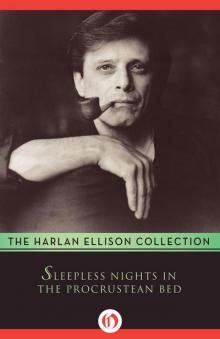 Sleepless Nights in the Procrustean Bed
Sleepless Nights in the Procrustean Bed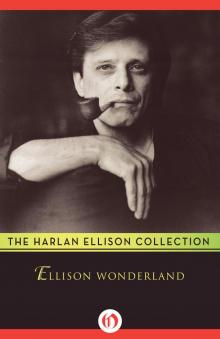 Ellison Wonderland
Ellison Wonderland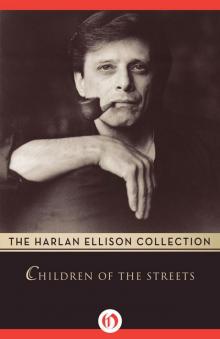 Children of the Streets
Children of the Streets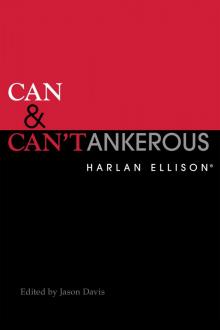 Can & Can'tankerous
Can & Can'tankerous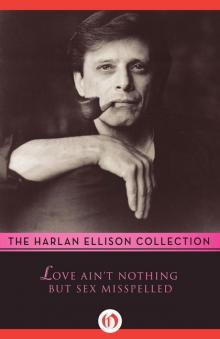 Love Ain't Nothing but Sex Misspelled
Love Ain't Nothing but Sex Misspelled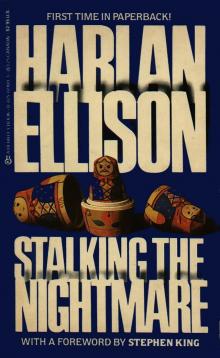 Stalking the Nightmare
Stalking the Nightmare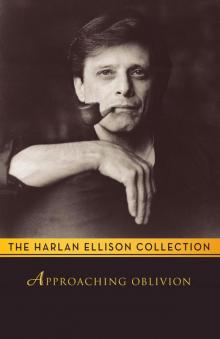 Approaching Oblivion
Approaching Oblivion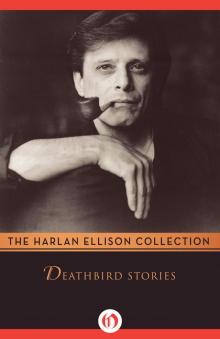 Deathbird Stories
Deathbird Stories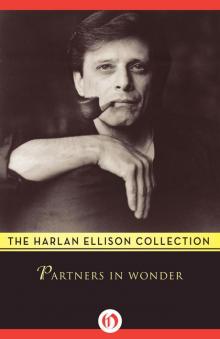 Partners in Wonder
Partners in Wonder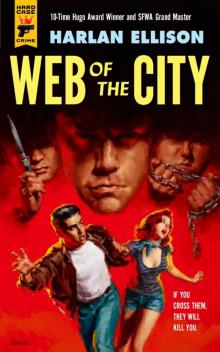 Web of the City
Web of the City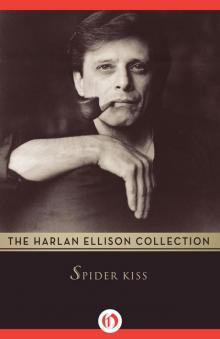 Spider Kiss
Spider Kiss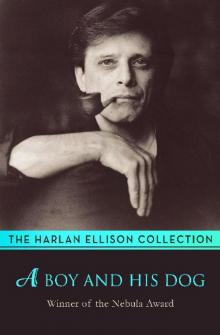 A Boy and His Dog
A Boy and His Dog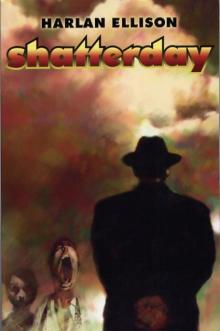 Shatterday
Shatterday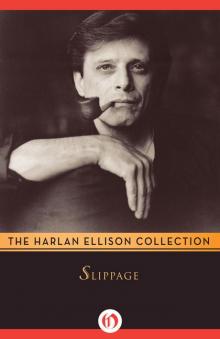 Slippage: Previously Uncollected, Precariously Poised Stories
Slippage: Previously Uncollected, Precariously Poised Stories Repent, Harlequin! Said the Ticktockman
Repent, Harlequin! Said the Ticktockman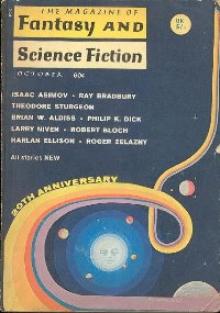 Come to Me Not in Winter's White
Come to Me Not in Winter's White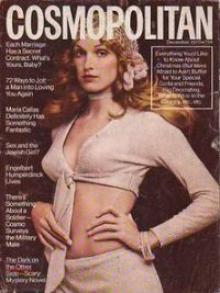 The Song the Zombie Sang
The Song the Zombie Sang The Other Glass Teat
The Other Glass Teat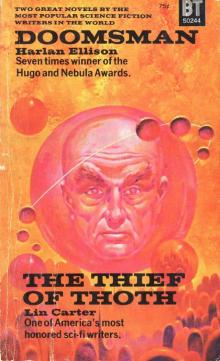 Doomsman - the Theif of Thoth
Doomsman - the Theif of Thoth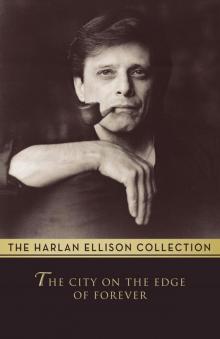 The City on the Edge of Forever
The City on the Edge of Forever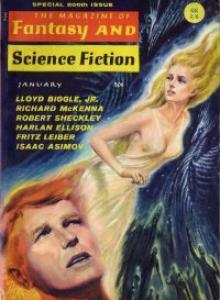 I See a Man Sitting on a Chair, and the Chair Is Biting His Leg
I See a Man Sitting on a Chair, and the Chair Is Biting His Leg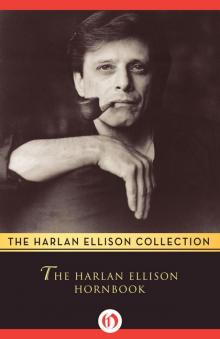 The Harlan Ellison Hornbook
The Harlan Ellison Hornbook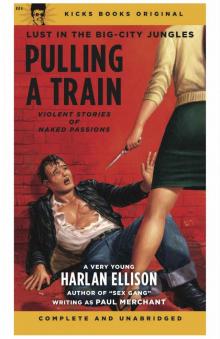 Pulling A Train
Pulling A Train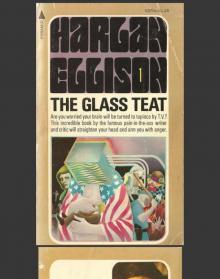 The Glass Teat - essays of opinion on the subject of television
The Glass Teat - essays of opinion on the subject of television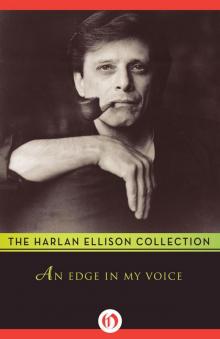 An Edge in My Voice
An Edge in My Voice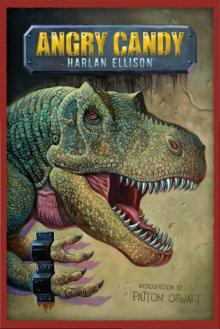 Angry Candy
Angry Candy Troublemakers
Troublemakers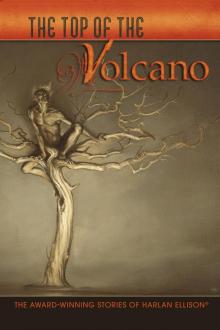 The Top of the Volcano
The Top of the Volcano Over the Edge
Over the Edge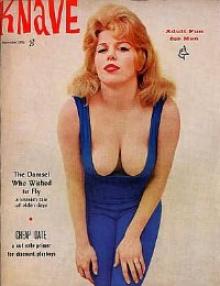 Survivor #1
Survivor #1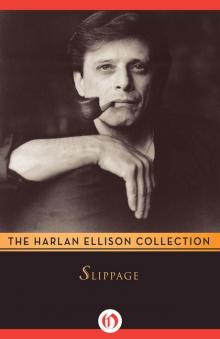 Slippage
Slippage